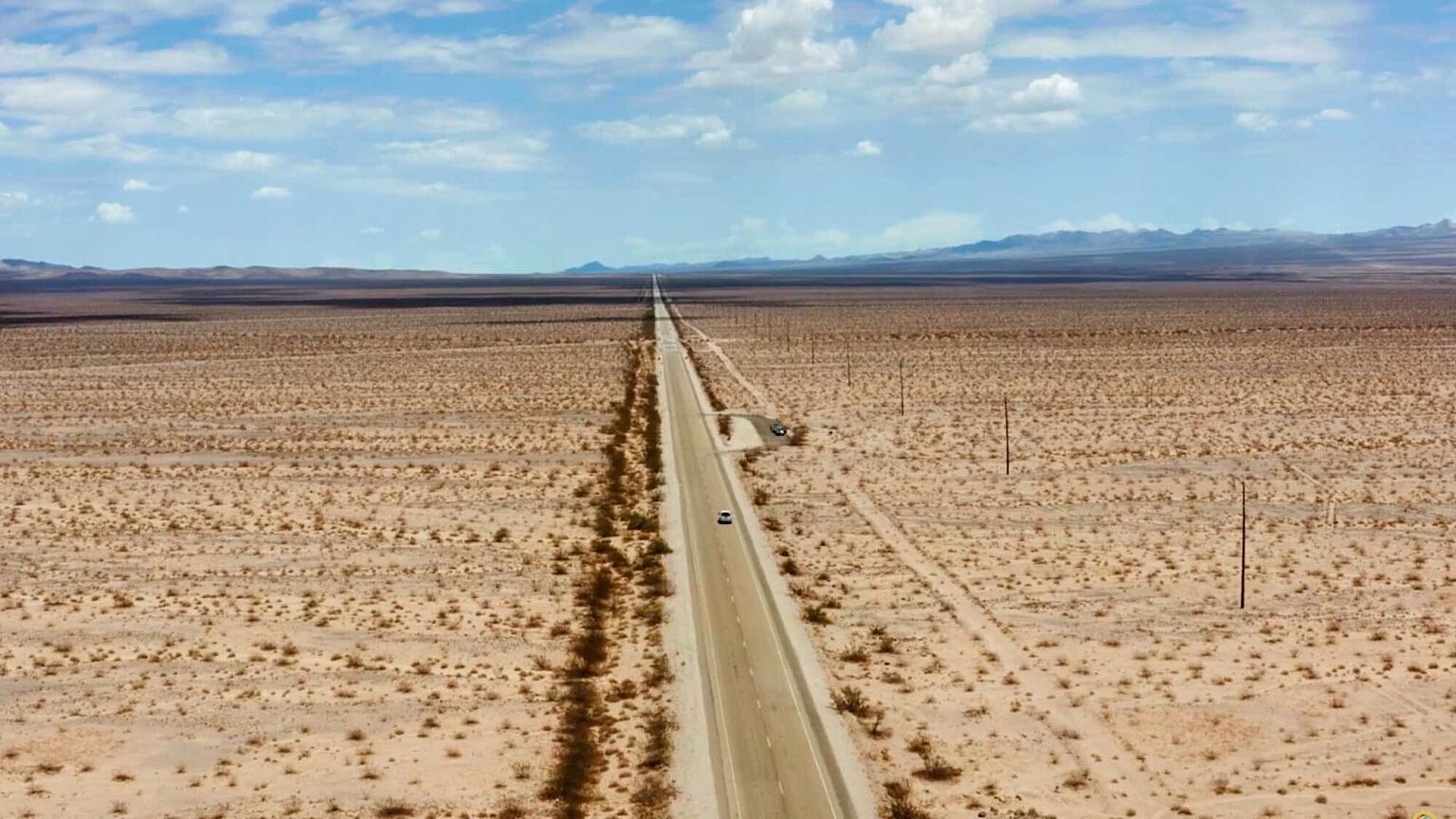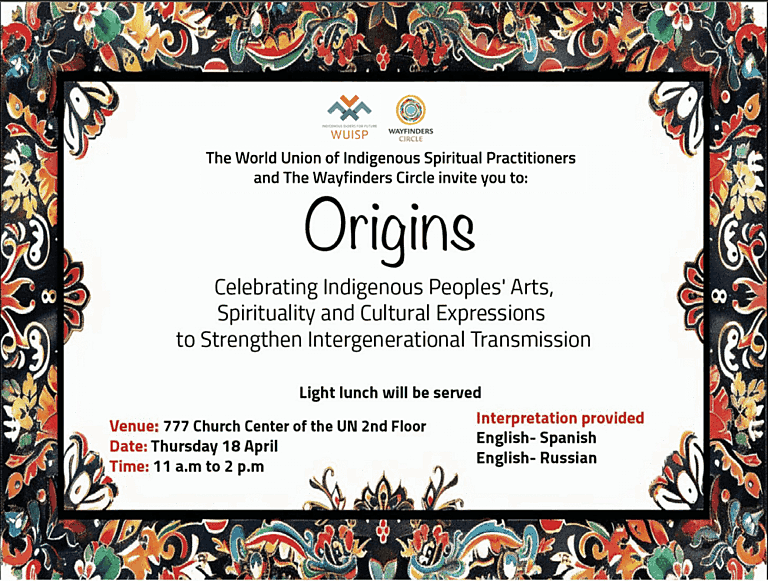Wayfinders Circle Twenty-Third Session of the Permanent Forum on Indigenous Issues Special Event

Conference
Twenty-Third Session of the Permanent Forum on Indigenous Issues Special Event
April 18, 2024 | UN Church Center 2nd Floor | New York City
Details
Organizers:
World Union of Indigenous Spiritual Practitioners (WUISP)
Wayfinders Circle
Co-sponsors:
Nia Tero
Pawanka Fund
Community First Development
The Network for Religious and Traditional Peacemakers
Interpretation provided
English- Spanish
English- Russian
Light Lunch will be served
Indigenous Peoples have cultivated their art, spirituality, and culture over millennia. Prior to the emergence of great civilizations and religions, peoples nurtured their beliefs and shared their daily life guided by common principles and rules. These values represent intrinsic aspects of human identity and underscore the profound connection between individuals, peoples and nature. Referred to as the ‘law of origin’ in many indigenous cultures, this deep-rooted connection serves to tie us with our ancestors and shapes our vision for future generations. Indigenous elders and youth play a fundamental role in preserving these foundational roots and spiritual values, contributing to the construction of a collective message of peace and harmony.
The Article 31 of the UN Declaration on the Rights of Indigenous Peoples clearly links the right of Self Determination to the right to maintain, control, protect and develop cultural heritage, traditional knowledge and traditional cultural expressions.
Considering the special theme of the 23rd session is “Enhancing Indigenous Peoples’ right to self-determination in the context of the United Nations Declaration on the Rights of Indigenous Peoples: emphasizing the voices of Indigenous youth, the World Union of Indigenous Spiritual Practitioners (WUISP) will host a special event where elders and youth from different part of the world will exchange experiences and dialogues about how arts, spirituality and cultural expressions have been key to preserve their identity as Indigenous Peoples. The event will include an interactive session, involving elders and youth and all participants with the purpose of creating a joint collective message. This message will become a powerful statement on the importance of acknowledging, respecting, and honoring the roots, cultures, traditions, spirituality and rights of Indigenous Peoples, promoting peace around the world.

Background
World Union of Indigenous Spiritual Practitioners (WUISP) is an open voluntary alliance of Indigenous spiritual practitioners, shamans, healers, sacred sites guardians, cultural activists, holders of traditional Indigenous knowledge and values, Indigenous organizations and clans committed to working together with the common goal of achieving the mission and vision for protection of Mother Earth and strengthening of pristine ties human-nature-culture for the survival and wellbeing of generations to come.
From 2021, WUISP has been implementing the innovative “ORIGINS Traditional Arts Fellowship Program” in the mountainous regions of Kyrgyzstan, Tajikistan, and Mongolia. The program focuses on creating a unique training and support system for Indigenous creative youth to reconnect with their heritage, deepen their roots, and renew their commitment to Earth guardianship through artistic and cultural practices. The knowledge, experiences and lessons learned from this program will be shared during this event. Drawing inspiration from the diverse traditions, customs, and practices of Indigenous communities, Origins aims to foster greater awareness and appreciation for the cultural richness, resilience of Indigenous peoples and their rights for self-determination.
World Union of Indigenous Spiritual Practitioners (WUISP) has actively participated in discussions at the Parliament of the World’s Religions 2023 and engaged in dialogues concerning the UN Plan of Action on Countering Hate Speech and Fostering Peace Mediation and Just Societies, facilitated by The Peacemakers Network in collaboration with the United Nations Office on Genocide Prevention of the Responsibility to Protect (OSAPG).
In addition, WUISP has been one of the founding organizations of Wayfinders Circle, providing spiritual guidance throughout the initiative’s development. Additionally, Pawanka Fund and Nia Tero are two other supporting organizations involved in the initiative.
The Wayfinders Circle is a global network of indigenous peoples from around the world who work to strengthen self-determination in managing their lands and territories and maintain cultural and spiritual continuity through intergenerational transmission. At present, the Wayfinders Circle comprises 15 members, including Indigenous communities that collectively steward over 37.5 million hectares of land and 72.8 million hectares of oceans across Latin America, Asia, Africa, the Arctic, the Pacific, North America, and Russia. wayfinderscircle.org
Objectives
- Promote cultural exchange by bringing together Indigenous artists and audiences from different backgrounds, age and regions, highlighting the unique identities, histories, and traditions of Indigenous communities worldwide.
- Raise awareness about the challenges and issues facing by Indigenous communities, including cultural preservation, intergenerational transmission, collective rights, environmental sustainability, peace, and harmony.
- Empower indigenous youth artists to share their stories, perspectives, and experiences with a global audience.
- Build collectively a powerful statement on the importance of acknowledging, respecting, and honoring the roots, cultures, traditions, spirituality and rights of Indigenous Peoples, promoting peace around the world.
Preliminary Agenda
Dialogue youth and elders and exhibition of experiences (2 Hours)
Indigenous peoples from different parts of the world will share their experiences, focusing on how they engage with youth, the concept of exchange and transmission, and the importance of spiritual and cultural continuity in their communities. They will highlight how these elements relate to the self-determination of Indigenous Peoples and their ongoing struggle for rights, land, and development while preserving their identity.
Experiences will be shared through various cultural expressions such as music, art installations, and more.
Interactive session (1 hour: 30 minutes explanation and time for people to participate and 30 minutes for lunch and informal interactions)
In the last hour of our session, we’ll have an interactive creative activity. We’ll showcase artwork that features ancient embroidery, a tradition found in every family in Central Asia. This embroidery holds significant meaning, with each symbol conveying a powerful message.
Participants will receive a piece of special cloth and have the option to write down their thoughts, ideas, wishes, or blessings, or they can draw symbols representing their nation or land. These contributions will be collected and displayed on a panel. When the elders return home, they can sew their piece onto the panel, creating a collective message to share with the world.
Art Exhibition
“Infinity” is showcasing the enduring journey of the indigenous peoples of central and inner Asia, embodying the wisdom, warmth, and soulful heritage of Indigenous ancestors, inviting to experience the eternal significance within life’s fleeting moments and embrace hope for a brighter, peaceful future.
The exhibition features diverse artworks from Buryatiya, Mongolia, Kyrgyzstan, and Pamir, offering through sculptures, embroidered panels, installations, paintings, and graphics, a fusion of modern and traditional cultures deeply rooted in ancient knowledge, inviting viewers to engage in self-reflection, contemplation, and interactive exploration of symbolic meanings and contextual narratives.
Information Co-sponsors
Nia Tero
Nia Tero works in solidarity with Indigenous Peoples who sustain thriving territories and cultures to strengthen guardianship of Earth and all beings. Nia Tero forges transparent and just agreements with Indigenous Peoples and local communities to ensure they can successfully defend and govern their territories, manage and protect their natural resources, and pursue their livelihoods.
Nia Tero is committed to working alongside Indigenous Peoples in geographies central to the well-being of all humanity. The initial regions include the Pacific Islands, Amazonia, and the North American Boreal Forest of Canada, where we work with Indigenous Peoples who share a collective territory and have strong governance systems in place to protect their lands and waters. By hearing and working with Indigenous leaders, we ensure their vision guides development of sound local, national and global policies. niatero.org
Pawanka Fund
Pawanka Fund is an Indigenous-Led Fund striving to support and empower Indigenous peoples around the globe. It is committed to the concept of intercultural philanthropy, based on ancestral practices of solidarity and reciprocity of Indigenous Peoples.
Pawanka responds to the needs of indigenous peoples building relationships of trust, networking and promoting articulation between local and global processes. It provides direct support to community led organizations for the recovery and revitalization of indigenous knowledge and learning systems in seven sociocultural regions of the world including North America, Latin America, Asia, Africa, Arctic, Pacific, and Russia. pawankafund.org
Community First Development
Community First Development is a First Nations-led development and research organisation and at the heart of our approach is community self-determination. The grassroots partnership approach is 100% community-driven, providing practical and specialised support across various industries. We are here to do whatever we can, when invited, to support and partner with First Nations’ communities as they create opportunity in education, health, governance, business development, environmental protection, and cultural preservation.
Our vision is to witness these communities flourishing and to contribute towards a better world for all Indigenous peoples. We are committed to working with diverse cultures to ensure recognition, respect, and equal treatment and value for all. www.communityfirstdevelopment.org.au
The Network for Religious and Traditional Peacemakers
The Network for Religious and Traditional Peacemakers was created as a result of former Secretary-General Ban Ki Moon’s report (2012), in which he said that “religious and faith-based leaders play an important mediating role in many conflict situations. In essence, the Network’s Mission is to build bridges between grassroots peacemakers and global players. The Network believes that creating linkages between Track 1 actors and Track 2 and 3 contribute to more effective peace process that has a long-term impact on the society and ensures no one is left behind.
As a connector, the Network brings together diverse religious and traditional actors from different localities and countries to collaborate on research, advocacy, skill, and capacity building within the context of the following three thematic areas: peace support, inclusivity, and prevention of violent extremism. Moreover, the normative guidelines of the Network are based on UN resolutions, such as UN Security Council resolution (UNSCR) 1325 on women, peace, and security, UNSCR 2242 reinforcing 1325, and UNSCR 2250 emphasizing the role of youth in decision making. In short, the Network has significant experience engaging with local communities of different faiths and traditions, including women and youth in conflict-affected countries and advancing peacebuilding efforts through mediation, dialogue, and cooperation.
The Core Group of the Network comprises of Finn Church Aid, the Organization of Islamic Cooperation, Religions for Peace and KAICIID Dialogue Centre, in addition to consulting with the UN Mediation Support Unit (MSU), the UN Alliance of Civilizations (UNAOC), the UN Office on Genocide Prevention and the Responsibility to Protect, UN Population Fund (UNFPA), UN Development Programme (UNDP), UN Women, and the Finnish Ministry of Foreign Affairs. www.peacemakersnetwork.org